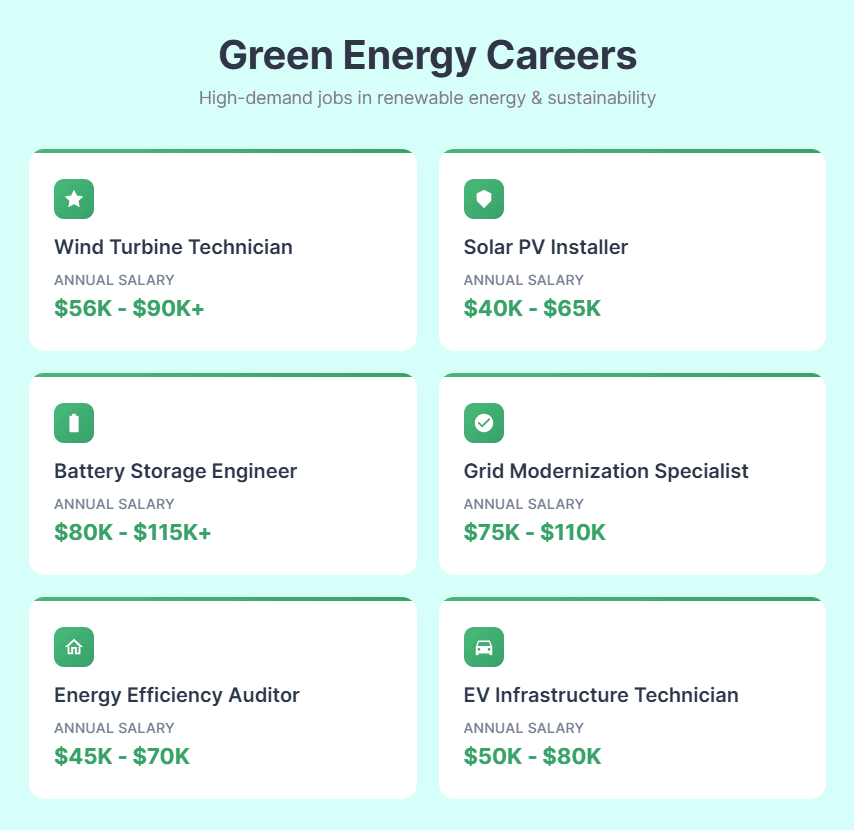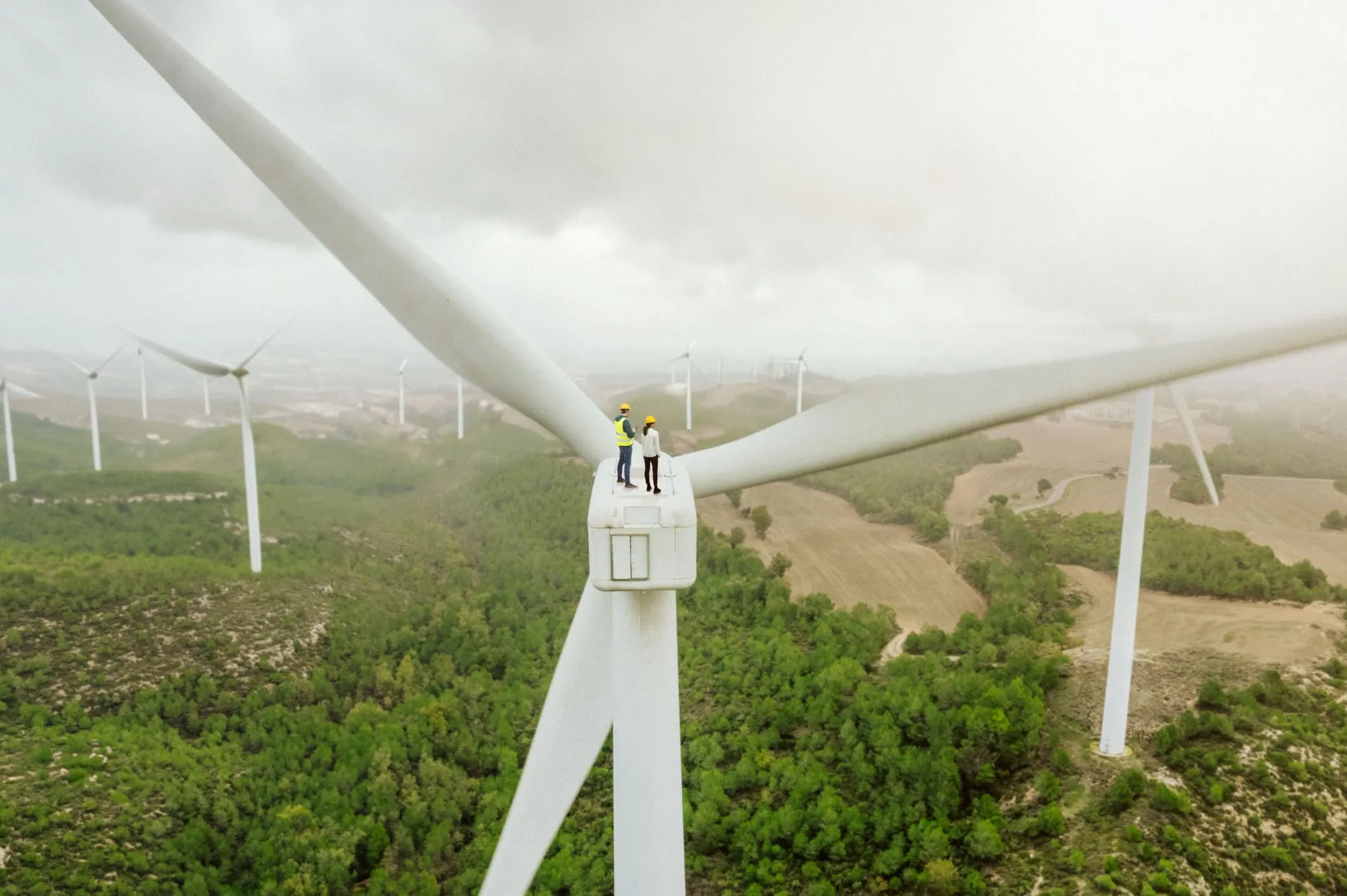Renewable energy jobs aren’t a “someday” story anymore. They’re hiring at more than twice the national average, and the demand for skilled workers is growing faster than companies can fill positions. Wind-turbine technicians are already clearing $90,000+ a year, and that’s without a four-year degree.
From solar panel installation to building the electric vehicle charging network, these jobs are popping up in every state, and in some cases, employers are even willing to train you from scratch. For people who want steady, well-paying work with long-term growth, this is one of the hottest job markets in the entire country right now.
We found the six renewable energy jobs with the fastest growth, what they are paying, and the exact training paths that can get you hired.
Why Renewable Energy Jobs Are Booming
The transition to clean energy is actually more than an environmental choice. It’s also a massive economic shift that’s opening thousands of jobs and drawing big investments. Federal and state programs are putting serious money into wind, solar, and battery projects… billions, in fact. At the same time, private companies are pushing hard to hit climate targets, modernize the grid, and keep up with the rising demand for cleaner energy.
And it’s paying off in job growth. The Bureau of Labor Statistics lists wind turbine service technician and solar photovoltaic installer among the fastest-growing jobs in the country right now.
One reason growth is so strong? There’s a skills gap. A lot of these jobs are new enough that there aren’t enough trained workers to go around. That means people from fields like construction, manufacturing, automotive, or electrical work, and even those switching from unrelated careers, can find a way in.
For jobseekers, this is one of those rare points where demand is high, pay is competitive, and companies are ready to train you for the long-term.

Six Hottest Renewable Energy Jobs
Renewable energy has a pretty wide and diverse range of jobs, from hands-on field work to high-tech engineering. Here are six that are hiring fast, what they are paying, and the skills that will help get you in the door fast:
Wind Turbine Technician
Salary: $56,000-$90,000+
What They Do: They install, maintain, and repair wind turbines. A lot of their work is super high above the ground, so comfort with, or at least not being afraid of, heights is an absolute must.
Training Path: Many wind turbine techs start with a one-year wind energy certificate program or on-the-job training from turbine manufacturers.
Solar Photovoltaic (PV) Installer
Salary: $40,000-$65,000
What They Do: Set up and maintain solar panels on rooftops or in large solar farms.
Training Path: Some solar installers start with a short trade school program or community college course; others are trained by their employer.
Battery Storage Engineer
Salary: $80,000-$115,000+
What They Do: Design and manage large-scale battery systems that store renewable power for when the sun isn’t shining or the wind isn’t blowing.
Training Path: Battery engineers usually require an engineering degree, but technician-level jobs are opening for those with electrical or mechanical backgrounds.
Grid Modernization Specialist
Salary: $75,000-$110,000
What They Do: Upgrade and maintain the systems that move electricity from renewable sources to homes and businesses.
Training Path: Electrical engineering or utility operations background is common, but mid-level grid specialist positions are available with certifications.
Energy Efficiency Auditor
Salary: $45,000-$70,000
What They Do: Inspect homes or commercial buildings to find ways to reduce their energy use.
Training Path: Short focused energy auditor certification programs are widely available; many start in construction or HVAC before moving into auditing.
EV Infrastructure Technician
Salary: $50,000-$80,000
What They Do: Install and service charging stations for electric vehicles.
Training Path: Electrical trade experience is helpful; many EV companies provide on-the-job training for new hires.
Training & Certification Pathways
One of the best things about green-collar work is there are way more than one entry point. It doesn’t matter if you’re fresh out of school, changing careers, or adding skills to your current trade, there’s a path in renewable energy jobs that can work for you.
Trade Schools and Community Colleges
Many have expedited and focused programs for wind energy, solar installation, or energy efficiency. These courses last anywhere from just a few months to two years, and they’re often designed to connect you directly with renewable energy employers.
Short-Term Certifications
If you’re really itching to get into renewable energy faster, you should check out, and get, certifications like NABCEP (North American Board of Certified Energy Practitioners) for solar, or BPI (Building Performance Institute) for energy efficiency. Some of them can even be completed in only weeks.
On-the-Job Training
Several renewable energy companies hire entry-level workers and train them on-site. This is especially common for solar installation and EV charger maintenance roles.
Apprenticeships
Programs through unions, utilities, or trade associations can pay you while you learn. They usually come with a guaranteed job offer at the end of the apprenticeship.
The thing to focus on is matching whatever training you decide on, realistically, to your timeline and your targeted job. A year in school could be well worth the time and energy for a higher-paying engineering position. Some certifications move you along faster, for solar in particular, you could be on the job in just a month or two.
Career Growth & Long-Term Outlook
The renewable energy jobs “boom” is not some short-term accident. The renewable energy industry’s expansion is backed by multi-year government plans, corporate climate pledges, and ongoing infrastructure upgrades across the country. Meaning the jobs that are being created today are very likely to stick around for some time.
Clear Advancement Paths
Most jobs also have room to grow. A solar installer can move into site management, sales, or even system design. Wind technicians might advance into supervisory positions or transition into training new people. Technical certifications and experience on major projects can seriously boost your pay, over time.
New Specialties Emerging
As AI, automation, and energy storage technology advances, new jobs will appear. From AI-driven grid optimization analysts to specialized battery maintenance crews. Workers who stay current on current tech changes will be in the best position to take advantage.
Opening Doors for More Workers
Renewable energy companies aren’t just looking for the usual suspects. A lot of renewable energy companies are making it a point to bring in veterans, career changers, and people from underrepresented groups. Some are even teaming up with community colleges, nonprofits, and apprenticeship programs to reach people who might not have pictured themselves in this kind of work. The idea is simple… Hire from the community and keep the crew representative of the customers they serve.
And the bigger picture: this industry isn’t only growing, it’s shifting into new uncharted territory. Start now, and you could end up in a job that literally didn’t exist today.
FAQs
Do I need prior experience to get into renewable energy?
Not always. Plenty of companies will train you from the ground up for roles like solar installation or EV charger maintenance. If you’ve done construction, electrical work, or anything mechanical… That’s a bonus, but having not isn’t a dealbreaker.
What’s the fastest way to get these jobs?
Short-term certifications are the quickest route. NABCEP solar training or BPI energy efficiency courses can wrap up in weeks instead of years. Some employers even foot the bill if you agree to work with them afterward.
Are these jobs mostly on-site or remote?
Most of them are hands-on and site-based, especially installation, maintenance, and field service roles. You’ll possibly find hybrid or remote roles in design, project management, or engineering.
Is renewable energy work physically demanding?
Many field roles involve physical activity, whether it’s climbing wind turbines or carrying solar panels. There are also less physically intensive options in design, analysis, and management if that’s a concern.
What kind of long-term stability do these jobs offer?
With billions in infrastructure investment and years of policy support already in place, the future looks solid. Demand is rising, and workers who build their skills now are very likely to have steady, high-paying work ahead.




